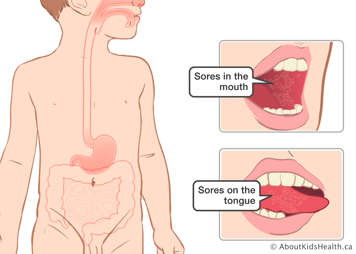To help prepare your child for the blood and marrow transplant (BMT), they receive high-dose chemotherapy and/or radiation. Both of these treatments can cause a complication called mucositis.
What is mucositis?
When the lining of the digestive tract and mouth become inflamed, it is called mucositis. It often causes sores inside the mouth, esophagus, stomach and bowel.

What causes mucositis?
To make room for the new bone marrow cells, your child is first treated with chemotherapy and/or total body irradiation. Both therapies can damage the thin layer of cells that line the digestive system. It can cause sores to develop in different parts of the body. When this protective lining is damaged inside the mouth, your child develops sores inside their mouth. This can be very painful and your child may have problems with swallowing, speaking, eating and drinking.
Mucositis in the throat, esophagus, stomach and bowel may cause your child discomfort and pain. It can cause fresh blood to appear in your child’s sputum, vomit and bowel movements. This bleeding will stop once the mucositis improves.
How is mucositis treated?
Medication
Medication such as morphine can effectively relieve the pain in your child's mouth. Other medications, such as antacids, can help overcome pain in the stomach and bowels.
Total parenteral nutrition (TPN)
If the mucositis is causing too much discomfort, your child may have a lot of trouble eating or drinking. To make sure your child continues to get enough nutrients, the nurse will deliver a special mixture of nutrients, which contains:
- protein
- fat
- sugar
- vitamins and minerals
This nutrition mixture is called the total parenteral nutrition (TPN). TPN is not a treatment for mucositis itself, but it is used to help your child get enough nutrients when they are experiencing too much discomfort. The nurse delivers this TPN through your child’s central line into the blood stream.
Good mouth care
Since sores in the mouth are a source of infection, it is important to keep the mouth as clean as possible.
For more information, please see the page on Daily care.
Using a Baking Soda Mouthwash every four hours will help reduce pain and speed up healing.
For more information, please see the page on Baking soda mouthwash.
If your child has mouth sores, how can you help overcome problems with eating?
Your child may find it painful to eat because of mouth sores. If they are having mouth sores or pain that is affecting their eating, drinking, or talking, let your doctor or nurse know as soon as possible.
Helpful ways to reduce the pain while eating
- Eat lukewarm or cold foods, rather than hot. This can include milk shakes, cottage cheese, yoghurt, water melon, gelatin and soft, canned fruit which you can blend together.
- Cook foods until they are tender.
- Drink through a straw to avoid sores inside their mouth.
- Eat high-protein, high-calorie foods so that their sores can heal faster.
- Try a liquid diet or include foods that are blended, such as shakes.
- Eat soft, non-irritating frozen foods such as popsicles, ice cream, frozen and yoghurt
- Drink fruit nectars and fruit flavoured juices as oppose to acidic ones.
- Rinse your child’s mouth with the hospital mouthwash every four hours. Use a soft toothbrush to clean teeth and gums.
Avoid foods that can aggravate your child’s mouth sores
Your child should avoid:
- tart or acidic foods and drinks such as citrus fruits and juices, and pineapple juice salty foods (including broth)
- strong spices such as chili powder, nutmeg, peppers, and cloves
- coarse foods such as raw fruits and vegetables, dry toast, grainy cereals and breads, and crunchy snacks
- alcoholic drinks
- extremely hot foods or drinks
